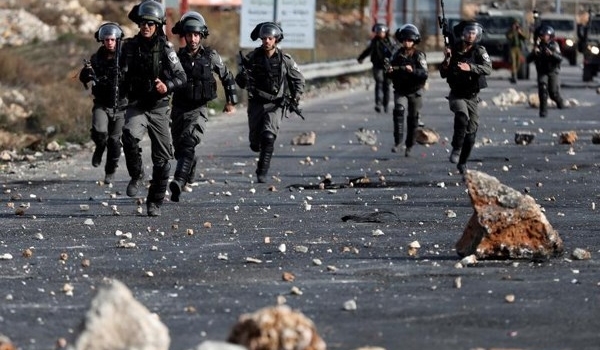
RNA - As maintained by the EU, the measure is “incompatible with human dignity.” True, the death penalty “constitutes inhuman and degrading treatment, does not have any proven deterrent effect, and allows judicial errors to become irreversible and fatal.” But what about some tangible policy actions too, such as boycotting Israeli goods coming to the EU, ending EU companies’ business relations and presence in illegal settlements, endorsing and implementing resolutions at the United Nations that are practically backed by the EU to end Israeli occupation and Palestinian suffering?
Not that Israeli forces don’t murder Palestinian protesters almost on a daily basis. But at the moment, the death penalty in Israel is still imposed behind closed doors where military judges pass sentences unanimously. Also, Israeli forces are themselves both the judge and the executioner when they kill Palestinian protesters point blank on the street and in broad daylight.
This has become so routine in recent days and weeks after Israel became emboldened by the US decision last month to recognize Jerusalem Al-Quds as Israel’s “capital,” outraging Palestinians and triggering warnings across the world. The UN resoundingly rejected that policy shift in a General Assembly vote. But that didn’t stop earlier this week the Israeli parliament from adopting a law that makes it more difficult to cede parts of Al-Quds to Palestinians, who want the eastern section of the occupied city as the capital of their future state.
The central committee of Netanyahu’s Likud Party also voted for a resolution over the weekend, asking Israeli law to be applied to “the freed settled expanses of the West Bank,” which refers to the parts of the occupied land where Israel has built illegal settlements in defiance of International Law and UN Charter since 1967.
You get the idea. Israel passed this new law to make it easier for the Trump White House to move the US embassy to the occupied city. It’s all about an occupying regime which is best at certain things, like militarized police, the omnipresence of guns, the ever-present possibility of violence, and the common belief in an enemy (be it a Palestinian kid or a terrified mother) who is throwing a stone or desperately asking Israeli troops to release her little son or daughter. It’s the default plot of the usurper regime’s entertainment strategy, where the violence is always consequence-free – even backed by judges and courts.
The monstrous irony of this psychopathic law is the way it combines a number of deeply problematic aspects of contemporary Israeli culture: militarized police, the omnipresence of guns and violence, and the common policy of naming Palestinians as enemies. This new law will turn these phenomena into the elements of a new game that turns Palestinian world inside out. Unavoidably, it calls attention to the essential flaw of Western trust in armed social order as well - the negative side effects of which are usually confined to Palestinian neighbourhoods, out of the Western media spotlight.
Here, the occupying regime forces kill Palestinians day in day out – which has been consistent for the last four decades or so. In most instances, the person who is killed is unarmed, even on a wheelchair. Western media reports always maintain that those who are killed by Israeli forces are unarmed protesters. In addition, many have been killed while protesting against Trump’s recent decision to declare Al-Quds as the new Israeli capital.
Perhaps the worst thing about all this is the Western shrug it generates: the acceptance of Israeli violence and crime against an occupied nation as inevitable and something that can only be countered with rhetoric. This is the essence of Western policy towards the Israeli-Palestinian conflict. It’s the default plot of the EU’s entertainment and gaming of international law as well, where the Israeli violence is always consequence-free. This is a usurper regime at perpetual war with not just the Palestinians but the world.
All that has to stop - not just with mere rhetoric and condemnation but through real policies and verifiable actions – both by the EU and the United Nations. No doubt the sanctity of life in occupied Palestine is still a target for the Zionist regime and its cynical allies in the West, still easily dismissed as, at best, a nice idea in a perfect world. The international civil society, including the EU, must see it as something else: the cornerstone of a sane future for all Palestinians living in the Holy Land, including Jews, Christians, and Muslims, meaning the indigenous population of Palestine.
It’s the essence not of idealism, but pragmatism. The EU’s foreign policy makers should pay greater attention to this pragmatism in their future statements. Else, this latest rhetoric and condemnation should be added to a gallery of moral assaults by the EU on the Zionist regime of Israel, its racism, and its religious chauvinism.
847/940